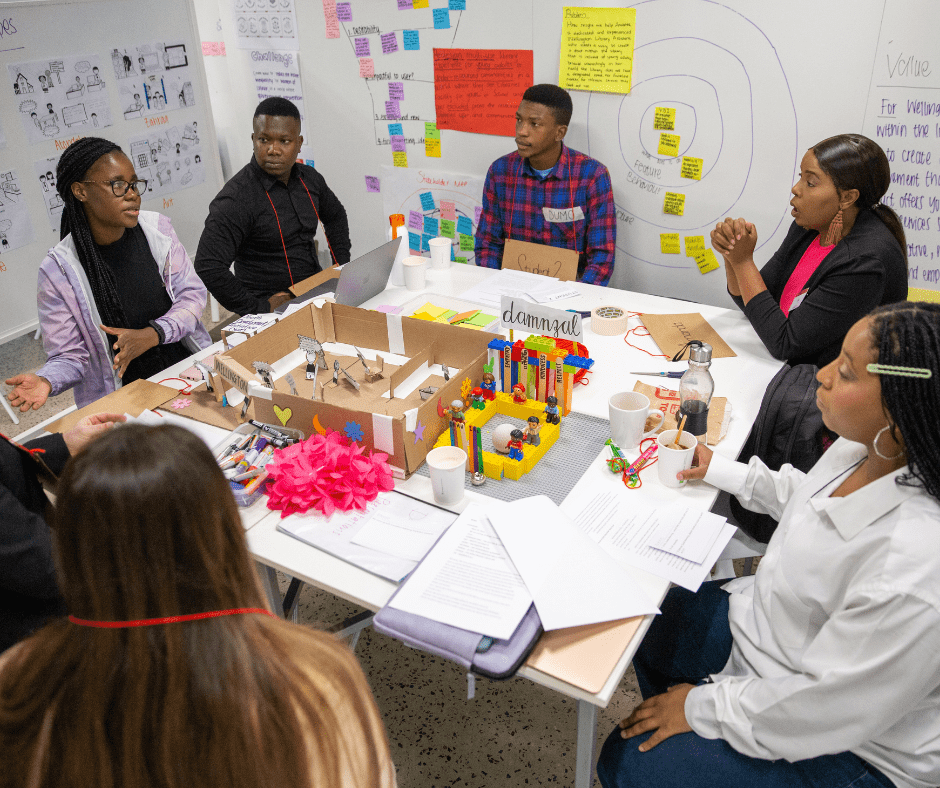You’ll know the names and faces of Elon Musk, Jeff Bezos and Mark Zuckerberg. In fact, you probably won’t be able to escape them. Their fame, influence and notoriety feature across the magazines we read, the TVs we watch, and the podcasts we listen to. Can you think of equivalent characters in Africa?
Local heroes and winners in Africa are not iconized like these towering figures in the Western World. This is not due to any lack of talent or influence. It’s a consequence of how people on the continent engage with one other. Africans embrace collaboration; individual success is secondary to the success of the community. The golden thread of this connectedness is best captured in the concept of Ubuntu – something which is currently inspiring designers and innovators tackling some of society’s most intractable problems around the world.
Putting people back at the centre of the problem-solving process
The spirit of Ubuntu can be summed up in the phrase: “I am because we are, and because we are, I am”. Instead of centralising respect and recognition towards individuals, Ubuntu requires us to appreciate our interconnectedness, and therefore, acknowledge how our success is a result of communal support and engagement. This exemplifies a mindset of cooperation over competition. And it is this emphasis that global problem-solvers are hoping to co-opt.
The concept of human-centred design is not a new one. It has been around for decades and is embedded in a problem-solving approach known as design thinking which has risen to prominence in the past 15 years or so. Design thinking’s fresh, effective and easy to grasp approach has made it popular for a range of applications.
Perhaps most famously, AirBnB used design thinking tools and ideas to help scale exponential growth and address user experience challenges on its platform.
But while many saw early successes such as AirBnB as a validation of a human-centred design approach to problem-solving, there has been concern in recent years that the design-led approach has been turning away from the principle of putting people first. Technology companies, for example, have misused some of the core principles for user experience improvement to collect more and more data, invading the privacy and integrity of the individual.
A global community of design-minded changemakers working in 150 organisations around the world, calling themselves Design at Business, are now looking to use this moment of reckoning to imbue a new discourse around design thinking and reshape the narratives defining its approach. The African ideal of Ubuntu will also be at the core of the upcoming design-thinking d.convestival – half festival, half conference – which, significantly, will be taking place on African soil for the first time this year.
Ubuntu-led design thinking in practice
Across Africa, design thinkers are already mainlining ubuntu into their approaches, with startling results. In Soweto, the engineering consulting firm Zutari – ranked first in the Top 225 International Design Firms in Africa – is working with local communities to co-create solutions to the challenges they face. Monique Cranna, Technical Director for Urban Planning, recently said, “What we have found is that the local community knows exactly what their issues and problems are and is willing to engage with an organisation like Zutari to articulate these issues and problems and co-create value-adding solutions”.
A similar community-led approach undertaken by the City of Cape Town in partnership with the City of Cape Town and the Cape Peninsula University of Technology (CPUT) has helped solve the persistent and nagging problem of waste management in the Doornbach informal settlement that is now being rolled out to all informal settlements in the area.
This community-centred approach, embodying the principles of Ubuntu-led design thinking, is working its way into the world of finance too. Typically, banks only provide credit scores for individuals, as it is easier to formulate a risk profile that way. But this approach neglects the shared family units that ripple across the African continent. These family clusters often share the financial burden of monthly income and expenses, and hence banks have been pushed to innovate risk solutions that take family unit credit scores into account. The process requires adapting to the community, rather than forcing the community to adapt to the process.
Breaking down siloes to unlock fresh solutions
A new life-centred approach, backed by the philosophy and spirit of Ubuntu, has significant potential to provide a framework for how human beings could interact with each other, as well as how to relate to the natural environment supporting them, to build a better future.
A key aspect of this will be the imperative to collaborate; to step beyond our siloes and to embrace a range of stakeholders from communities on the ground to leaders at the highest level as well as across sectors. Although the private sector may be best positioned to embrace the innovation associated with design thinking, the public sector has the experience of working on large, multi-stakeholder projects. Together, they have the power to unlock fresh solutions.
We’ve seen the power of this approach – this is not just an abstract or academic theory – and there is real hope that it can now be scaled. The more people and organisations who embrace the wisdom of community and collaboration, keeping human well-being firmly at the centre of the problem-solving process, the more likely we can successfully address our shared socio-economic and environmental challenges.
Ends
Ulrich Meyer-Höllings is the Co-founder at ThirdSpaceAfrica, and the Design at Business chapter lead for South Africa. He will be facilitating a discussion on how ubuntu impacts design, innovation and entrepreneurship at the upcoming d.confestival. Find out more https://dschoolafrika.org/events/d-confestival/.



